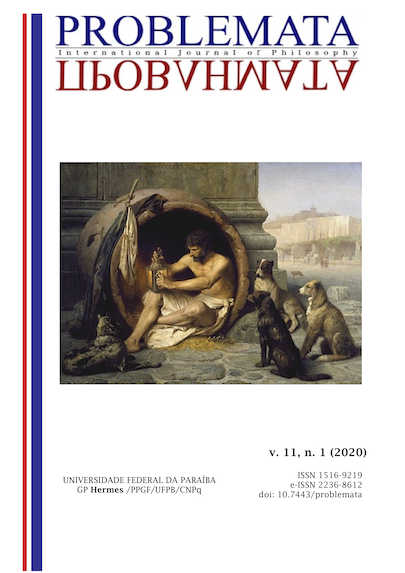ONTOLOGICAL WORK AND THE MEANINGS OF LABOR IN THE CAPITALIST MODE OF PRODUCTION
DOI:
https://doi.org/10.7443/problemata.v11i1.46902Keywords:
Ontological work, Workers, Sense of work, Capitalist mode of productionAbstract
At the global level, the rights of the working class have been attacked by governments of different political matrices. In Brazil this is no different. Recently the government of then- President Michel Temer approved in the National Congress the labor reform, which retired the rights of the worker. This reform was carried out under the justification of leveraging the country's economic development and, consequently, generating jobs. This research aims to: a) to discuss, in the light of Marxist theory, the Ontological foundation of work and the work process in the capitalist mode of production (MPC); b) to encourage discussion about the ontological sense of work; and c) to establish a comparison between the ontological nature of work and the nature of the work in the MPC. Methodologically, this is a bibliographic, qualitative and exploratory research; theoretically, it is based on works by Karl Marx, Karl Marx and Engels, Ricardo Antunes, Sérgio Lessa, among others. We conclude that, at the present moment, it is not enough that workers claim only improvements in working conditions and wages, it is necessary to radically transform work and production relations.
Downloads
References
ANTUNES, R. O caracol e sua concha: ensaios sobre a nova morfologia do trabalho. São Paulo: Boitempo, 2005.
______. Os sentidos do trabalho: ensaio sobre a afirmação e a negação do trabalho. São Paulo: Boitempo, 2009.
ANTUNES, R.; SILVA, MAM. O avesso do trabalho. v.1. São Paulo: Expressão Popular, 2010.
HOBSBAWM, EJ. Mundos do Trabalho. São Paulo: Editora Guerra e Paz, 2000.
KOHAN, N. Dicionário básico de categorias marxistas. p. 1-15, 2016. Disponível em: <http://pcb.org.br/portal/docs1/texto3.pdf>. consulta em 05 de abr. 2019.
KONDER, L. Marxismo e alienação: contribuição para um estudo do conceito marxista de alienação. 2.ed. São Paulo: Expressão Popular, 2009.
LESSA, S. Para compreender a ontologia de Lukács. Ijuí (RS): Unijuí, 2007.
______. Mundo dos homens: trabalho e ser social. 3.ed. São Paulo: Instituto Lukács, 2012.
LESSA, S; TONET, I. Proletariado e sujeito revolucionário. São Paulo: Instituto Lukács, 2012.
LUKÁCS, G. Para uma ontologia do ser social. São Paulo: Boitempo, 2012.
MARX, K. O Capital: a crítica da economia política. Livro I. v.1. 2.ed. Rio de Janeiro: Civilização Brasileira, 2008.
______. Miséria da filosofia: resposta à filosofia da miséria, do senhor Proudhon. 1. ed. São Paulo: Expressão Popular, 2009.
______. O Capital: crítica da economia política. Livro I. v.1. 27.ed. (rev) Rio de Janeiro: Civilização Brasileira, 2010.
MARX, K; ENGELS, F. A ideologia alemã (Feuerbach). São Paulo: Hucitec, 1991.
MASCARO, Alysson Leandro. Crise e Golpe. 1 ed. São Paulo: Boitempo, 2018.
MÉSZÁROS. I. A crise estrutural do capital. 2.ed. São Paulo: Boitempo, 2011.
PEREIRA, M. A. Os desafios da classe trabalhadora na crise do bloco histórico hegemônico no início do século XXI (109-128). In: A Categoria bloco histórico em Antônio Gramsci. Ed. Clube dos Autores, 2012.
Downloads
Published
Issue
Section
License
Authors who publish with this journal agree to the following terms:
- Authors retain copyright and grant the journal right of first publication with the work simultaneously licensed under a Creative Commons Attribution License that allows others to share the work with an acknowledgement of the work's authorship and initial publication in this journal.
- Authors are able to enter into separate, additional contractual arrangements for the non-exclusive distribution of the journal's published version of the work (e.g., post it to an institutional repository or publish it in a book), with an acknowledgement of its initial publication in this journal.
-
- Authors are permitted and encouraged to post their work online (e.g., in institutional repositories or on their website) prior to and during the submission process, as it can lead to productive exchanges, as well as earlier and greater citation of published work (See The Effect of Open Access).





